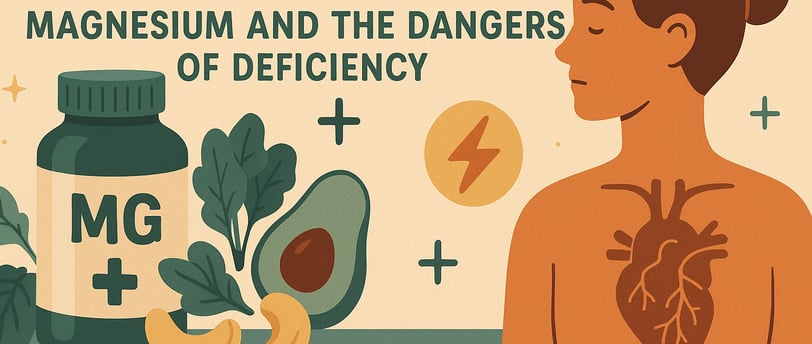Unlocking Health: The Essential Benefits of Magnesium and the Dangers of Deficiency
Magnesium is a vital mineral that plays a crucial role in numerous bodily functions. It is involved in over 300 biochemical reactions, contributing to everything from energy production to muscle function. Yet, despite its importance, many individuals are unaware of the full extent of magnesium's benefits and the potentially serious consequences of deficiency...
4/11/20252 min read


Understanding Magnesium: The Unsung Hero of Nutrition
Magnesium is a vital mineral that plays a crucial role in numerous bodily functions. It is involved in over 300 biochemical reactions, contributing to everything from energy production to muscle function. Yet, despite its importance, many individuals are unaware of the full extent of magnesium's benefits and the potentially serious consequences of deficiency.
The Incredible Benefits of Magnesium
Integrating adequate magnesium into your diet can lead to significant health improvements. First and foremost, magnesium contributes to bone health. By assisting in the regulation of calcium levels, it helps prevent osteoporosis and promotes overall bone strength. Furthermore, magnesium plays a pivotal role in heart health by supporting a normal heartbeat and reducing the risk of cardiovascular diseases.
Another major benefit is its impact on mental health. Research suggests that magnesium can help alleviate symptoms of anxiety and depression. This is likely due to its ability to regulate neurotransmitters that modulate mood and emotional responses. Additionally, magnesium supports muscle function, ensuring proper contraction and relaxation, hence minimizing the risk of cramps and spasms during physical activity.
Recognizing the Signs of Magnesium Deficiency
Despite the importance of this mineral, magnesium deficiency is surprisingly common, affecting various demographics. Symptoms can range from mild to severe, often including fatigue, weakness, and muscle cramps. In more serious cases, magnesium deficiency can lead to numbness, abnormal heart rhythms, and even seizures.
Factors contributing to magnesium deficiency can vary significantly. High levels of stress, poor dietary habits, certain medications, and specific health conditions like diabetes can exacerbate the likelihood of becoming deficient. Therefore, it is essential to be proactive about magnesium intake to avoid these potential health issues.
How to Boost Your Magnesium Levels
Fortunately, there are many ways to ensure you are receiving adequate magnesium. Incorporating magnesium-rich foods into your diet is the most effective method. Foods such as leafy green vegetables, nuts, seeds, legumes, and whole grains are excellent sources. For some individuals, magnesium supplements may also be beneficial, but it's crucial to consult with a healthcare provider before starting any new supplement regimen.
In conclusion, magnesium is an indispensable nutrient with numerous benefits that contribute significantly to overall health. Understanding the signs of magnesium deficiency and finding ways to boost dietary intake can lead to enhanced well-being and vitality. Taking proactive measures to ensure adequate magnesium levels is a vital step toward a healthier lifestyle.
Buy our recommended magnesium supplement here https://amzn.to/4jyAv5H
